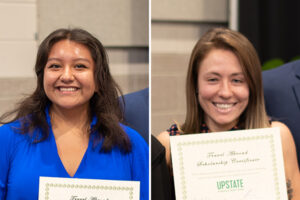Up Magazine / Passport to Adventure

Two students who attended the Global Career Forum in the fall came away with more than valuable job information. Jasmin Elizalde, a junior, and Malea Burns, a senior, were each awarded a $2,500 travel abroad scholarship to cover program expenses.“I’ve always wanted to study abroad, I just didn’t know how I was going to get the money or if I was going to be able to have the opportunity,” said Elizalde, who is considering France for her travels. “Getting this award really gives me a chance to explore that option.”
For Burns, whose appetite for travel was whetted during a summer trip to Spain led by Maria Montesó, senior instructor of Spanish, the award is a chance to keep building her Spanish skills. “I feel like this is the opportunity I really needed to help with my Spanish major,” she said.
Five other students received grants to cover the cost of a passport. The awards were a new feature of the Global Career Forum this year, and were made possible by event sponsors whose representatives led roundtable discussions with students and provided information about the companies.
